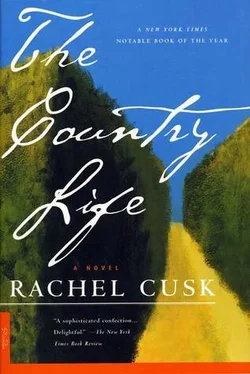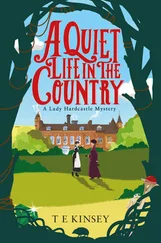‘Do you want to go home?’ he said suddenly, to my horror. His face was expressionless in profile, and his tone of voice suggested that I might want to go home because I had left something there, or was expected back.
‘Of course not!’ I exclaimed; although, still in a malevolent humour, I could not prevent my protest from sounding slightly insincere.
‘You were doing that,’ he observed flatly, in response to what I had no idea. He put out his arm in a clutching motion.
I realized that he was referring to my behaviour in the Land Rover.
‘I’m a nervous passenger,’ I said.
‘Do you want something?’
He gave no indication as to what this something might be. Eventually, I realized that he was asking me whether I wanted a drink; and at that moment I remembered the forgetful itch I had experienced in Pamela’s kitchen. I had no money; and had been trying, I now knew, to remind myself to ask her for some. I wondered what I should do. Were I to permit Mr Trimmer to buy me a drink, he would surely expect one in return during the course of the evening. Meanwhile, my failure to respond to his offer had caused him to turn and look enquiringly at me. His face really was quite extraordinary. It looked as if a door had been repeatedly slammed on it. Not wishing to offend him further, I decided on a plan.
‘I’ll get them,’ I said, gushingly.
His head gave a perky twitch.
‘Very kind,’ he said, nodding.
With the exaggerated gestures of a pantomime artist, I began clutching at my hip, as if feeling for a handbag. Not finding one, I looked this way and that, my face displaying carefully calibrated degrees of surprise, disbelief, and then outright panic.
‘Oh no!’ I cried. ‘I’ve forgotten my handbag!’
It was not the cleverest of ploys, and I am not the best of actresses. Mr Trimmer did not respond enthusiastically to the news. In fact, he looked as if he wished that I had taken him up on his offer of a drive home. At first I feared that he didn’t believe me; but then I remembered what Pamela had said about him being ‘tight’.
‘They’re on me, then,’ he said.
‘I’m terribly sorry,’ I added, although it would probably have been sensible to have said nothing more. ‘I can’t think what came over me. It’s not like me at all to be so disorganized.’ Mr Trimmer regarded me dumbly. ‘Oh,’ I said, as I realized that he was waiting for me to tell him what I wanted. ‘I’ll have a G-and — a gin and tonic, please.’
Mr Trimmer bought a half-pint of beer for himself, and carried it, without consultation, to a small table at the back of the pub. We sat in silence, our drinks untouched between us. The pub itself was very pleasant, although slightly gloomy for a summer evening. With its low ceiling and phalanx of black beams, it was like sitting in the ribcage of some vast animal. Fruit machines pulsed steadily in the shadows.
‘Have you been abroad?’ said Mr Trimmer presently. He picked up his glass and sipped from it.
‘Yes,’ I said, unsure whether a fuller confession, listing locations and frequency, was required.
‘So you speak Spanish, then.’
‘No, I don’t, I’m afraid.’ I said, bemused. Taking my cue from Mr Trimmer, I picked up my own glass. ‘Have you ever been abroad?’
‘No,’ he said, nodding. ‘My friend has. He speaks Spanish.’
‘Oh.’
‘Would you agree,’ he enlarged, after a lengthy pause, ‘that tourists have a … detrimental effect on the local … communities?’
‘It depends,’ I said.
‘So you don’t agree.’
‘It depends on the extent of the tourism, and the type of tourist who goes to a place,’ I said. Even as the words were coming from my mouth I had a sense of their futility. I felt as if I were chewing dry bread.
‘My friend thinks it does. He says all the locals want to do is get their hands on your money.’
‘Because they have so little in comparison?’ I hazarded.
‘That’s right!’ Mr Trimmer seemed genuinely pleased by my reply. I had evidently confirmed his friend’s opinion, elevating it to the status of a theory.
‘But tourism itself can bring money,’ I added cautiously. ‘So it’s not entirely a bad thing.’
Mr Trimmer’s enthusiasm was abruptly snuffed out. His eyebrows drew together, creasing his forehead; an alarming expression, as if someone were pressing hard on either side of his face. I noticed that, while I had drunk half my glass, he had barely skimmed his.
‘How long have you worked for the Maddens?’ I said, feeling that a change of subject was required.
‘Five years, about,’ muttered Mr Trimmer. His expression had modulated to one of resistance, like a child at whose lips a medicine spoon is probing.
‘And do you like it there?’
He did not reply at all to this. I glanced at my watch, and saw to my dismay that barely half an hour had passed.
‘Madden,’ he said suddenly. ‘Mad-den. Mad ’un. Get it?’
‘Oh yes!’ I trilled.
‘Are you mad?’
‘I beg your pardon?’
‘Women say they are. Axe you?’
‘Certainly not.’
‘That’s all right, then.’ Another long pause. ‘Her, his missus, she’s a bad one.’
‘Axe you talking about Mrs Madden?’
‘Mrs Mad ’un.’ He nodded. ‘I don’t like her.’
‘Why not?’
I was resolved at any moment to put a stop to this bizarre conversation; but I could not resist letting Mr Trimmer run on, just to see what he would say. It is hard to convey how alien his manner of speech was to me. I could barely understand what he was saying; not because of his accent, although it was strong, but because his words and the sequence of his ideas, punctuating in addition vast lagoons of silence, did not conform to any pattern I recognized. It struck me that perhaps he didn’t talk very much. He was embarked now on another great pause, his mouth and eyebrows labouring as if with the effort of giving birth to a fully formed sound.
‘She’s a shagger ,’ he pronounced finally.
‘A what?’
‘I know. I’ve seen her. I see everything that happens. Not just that business.’
‘What business?’
‘That’s what gave him the heebie-jeebies.’ He tapped the side of his head. ‘He doesn’t know it all, though. If he did …’ His fingers uncurled by his temples to form what I took to be a gun. He gave me an idiotic grin.
‘What business?’ I repeated.
‘Nothing to do with you,’ Mr Trimmer curtly replied. ‘You don’t need to worry yourself. It’s married business.’
I had by this time finished my drink. Mr Trimmer was halfway through his. I wondered if he would offer me another, or whether I would have to wait until he finished.
‘What do you mean, the heebie-jeebies?’ I persisted, hoping that he would be more forthcoming on the subject of Mr Madden.
Mr Trimmer shook his head.
‘He’s mental,’ he said presently. ‘He’s going to hurt his self one of those days.’
‘How?’
‘Walk into one of his own traps, won’t he? I nearly done it enough times. Came near enough yourself, and all.’
‘In the top field?’
He nodded.
‘I thought the step was broken?’
Mr Trimmer swelled silently.
‘You mean it was supposed to be?’
He folded his arms over his chest.
‘Why? To discourage people from using the footpath?’
‘ Some people,’ he finally pronounced. ‘ Some people.’
‘Who?’
‘You’re nosy.’ He tapped his nose and nodded at me. ‘You.’
‘Not nosy. Curious. So,’ I recapped, ‘Mr Madden sabotages his own footpaths to keep some people off them. It doesn’t make any sense. Surely if someone got hurt, they would go to the police and he’d get into trouble?’
Читать дальше












